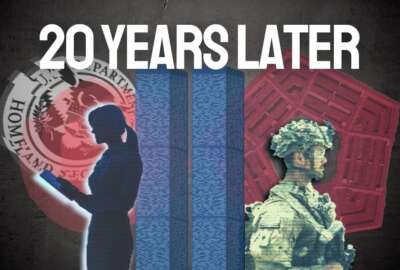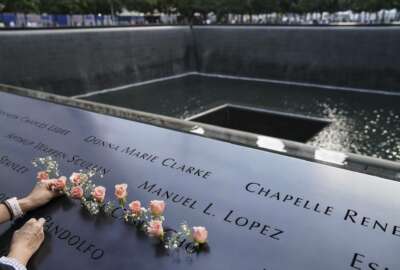Hubbard Radio Washington DC, LLC. All rights reserved. This website is not intended for users located within the European Economic Area.
A Tuesday like no other: State Dept. remembers its 9/11 first responders and a new generation of diplomats
As part of our special report, “A Tuesday like no other,” we spoke with members of the State Department about how Sept. 11 impacted them.
Elizabeth McAleer, now more than 25 years into her career at the State Department’s Diplomatic Security Service, was at her desk on the 34th floor of the Jacob Javits Federal Building in New York City when the order went out to evacuate.
“I immediately said, ‘Hey, this is a terrorist attack, we need to evacuate,’” McAleer, now an assistant special agent in charge of the DSS New York Field Office, said in an interview.
Everyone in the office, about 20 special agents at the time, grabbed their service weapons and radios, took the stairs, and gathered at a rally point on Church Street — less than a mile from the World Trade Center.
Chris Gu, now the deputy assistant director of field office management and a lifelong New Yorker 22 years into his tenure at DSS, stood at the rally point, looked at the fire and smoke pouring out of the World Trade Center, and remembered the last time those buildings were attacked.
“I’m just thinking back that they tried to knock down these two buildings back in ’93 and they failed. And they attempted it again, and they’re going to fail again. These two buildings are still standing, we’re going to rebuild. I remember just turning my back and this lady next to me said, ‘Oh my God, Oh my God, Oh my God,’ and I turned around as the first tower collapsed. It was just coming down like it was slow motion,” Gu said in an interview.
McAleer and the rest of her team joined the crowd running north when the first tower fell.
“It felt like the building was coming towards us. We weren’t many blocks away, and people just started running north. When they started running north, they were just pointing to the buildings collapsing,” she said. “It was so surreal. Nobody was screaming, just mouths were open, and then people were just falling all over the place. We were picking people up, people were crying in the street. The smoke and the dust and the debris were just coming towards us. It was absolutely horrific.”
McAleer kept walking north, until she arrived at the Grand Hyatt Hotel at Grand Central Station. It was a command post DSS set up ahead of the United Nations General Assembly meeting in December.
When she arrived, she heard Secretary of State Colin Powell’s two adult children, who lived in Manhattan, needed security. So McAleer went back downtown and picked up one of Powell’s children in an armored vehicle.
DSS brought both of Powell’s children to a secure location, and McAleer stayed with them into the night. She arrived home around 2 a.m. the next morning.
After being released from the rally point, Gu raced home to check on family, including his wife, who worked in a building a block away from the World Trade Center.
In the weeks following the attacks on Sept. 11, the Diplomatic Security Service assisted the Federal Emergency Management Agency at Ground Zero, driving FEMA personnel as they installed lights in preparation for a 24/7 rescue mission.
They brought in firefighters, doctors and nurses, gas for generators, emergency supplies to first responders. They brought in officials from the Energy Department and blueprints of the buildings that had stood there.
And when the mission was no longer a rescue mission, they gathered evidence from Ground Zero and brought it to the FBI’s Joint Terrorism Task Force for analysis.
That day, 52 DSS special agents joined the massive surge of first responders who rushed to assist in the aftermath of the 9/11 terrorist attacks that destroyed the World Trade Center.
Another 23 agents and additional support personnel worked alongside dozens of special agents from satellite field offices up and down the East Coast. DSS kept a command post at Ground Zero for about six weeks after 9/11, but its mission was forever changed that day.
“As far as the heightened state — that never left us,” McAleer said.
A new generation of diplomats
Secretary of State Antony Blinken, speaking after Gu at the department’s commemoration of the 20th anniversary of the 11 attacks, called his memories that day “vivid and painful,” but also recalled solidarity from the global diplomatic community.
“Around the world, we saw people come forward to show their extraordinary solidarity and empathy. They congregated outside our embassies, consulates — praying, singing, crying. They left handwritten notes, flowers, candles, drawings, mementos,” Blinken said.
Gu, during the interview, said foreign dignitaries started to arrive before the UN General Assembly formally started, because they all want to visit Ground Zero to pay their respects at nearby fire stations.
“We were running protected details on these visiting dignitaries, and we visited so many fire stations,” he said.
September 11th also inspired the next generation of diplomats to join the State Department.
“Those new officers walked into this building, I think, having some sense of how hard the work would be, how much we were up against, how vital it was that they succeed. But, of course, a full appreciation for all of that came with time, came with experience, came with engagement — but from day one, they threw themselves into the challenges with total commitment,” Blinken said.
Rachel Sunden, who volunteered for the Red Cross down at Ground Zero, joined the State Department two years later, after learning about Powell’s initiative to diversify the Foreign Service.
She now serves as the consular chief at the U.S. Embassy in Doha, Qatar, where she is assisting in the evacuation from Afghanistan. Sunden said several Afghan women have given birth en route to the U.S.
“To know that these little babies’ lives have changed in a moment, and they’re going to go and live in the United States is really interesting and amazing. I’ll think about some of these little kids I’ve met forever and wonder where they end up,” she said.
Looking back at her tenure in the Foreign Service, Sunden said she hopes the department continues to expand the variety of people who represent the U.S. as Foreign Service officers.
“It’s our colleagues from all different kinds of diverse backgrounds that make the American Foreign Service so different than many others. There’s no one face of the United States,” she said.
Rachna Sachdeva Korhonen, also joined the department because of 9/11, wanting to join public service in the aftermath of the attacks. She now serves as the executive director of the Joint Executive Office for the Bureau of Near Eastern Affairs (NEA) and the Bureau of South and Central Asian Affairs (SCA).
Korhonen said she was recently at Dulles International Airport in Virginia to welcome Afghan evacuees entering the U.S. As an immigrant who came to the U.S. at the age of 12, not speaking any English, she said the moment reminded her of her own arrival into the country.
“We’re watching pictures of young Afghan women and young girls getting off the plane and arriving to the U.S… I’m looking at them and I have just these amazing memories of the U.S.,” she said.
During her tenure in the Foreign Service, Korhonen spent nine years in Kuwait, Saudi Arabia and Iraq. She said she’s spent her career trying to convey how diversity makes the Foreign Service unique.
“For me, actually making sure that Saudis and Kuwaitis and Iraqis in this region understand that Americans can look like me, can eat different food and speak different languages, and still be as loyal to the red, white and blue is really important,” she said.
Copyright © 2024 Federal News Network. All rights reserved. This website is not intended for users located within the European Economic Area.
Jory Heckman
Jory Heckman is a reporter at Federal News Network covering U.S. Postal Service, IRS, big data and technology issues.
Follow @jheckmanWFED
Related Stories
Related Stories
-
A Tuesday like no other: Did it really change everything? Federal Report





